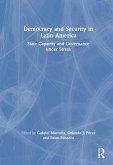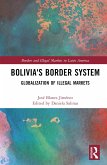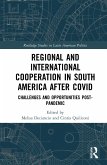- Gebundenes Buch
- Merkliste
- Auf die Merkliste
- Bewerten Bewerten
- Teilen
- Produkt teilen
- Produkterinnerung
- Produkterinnerung
This book investigates the return of workers' self-management in recent decades as responses to recurring neoliberal crises. This book will be of interest to researchers across the fields of development studies, labour studies, political economy, sociology of development, sociology of work, and political science.
Andere Kunden interessierten sich auch für
![Democracy and Security in Latin America Democracy and Security in Latin America]() Democracy and Security in Latin America167,99 €
Democracy and Security in Latin America167,99 €![Democratic Latin America Democratic Latin America]() Craig L. ArceneauxDemocratic Latin America169,99 €
Craig L. ArceneauxDemocratic Latin America169,99 €![Bolivia's Border System Bolivia's Border System]() José Blanes JiménezBolivia's Border System149,99 €
José Blanes JiménezBolivia's Border System149,99 €![Psychoanalysis as Social and Political Discourse in Latin America and the Caribbean Psychoanalysis as Social and Political Discourse in Latin America and the Caribbean]() Psychoanalysis as Social and Political Discourse in Latin America and the Caribbean162,99 €
Psychoanalysis as Social and Political Discourse in Latin America and the Caribbean162,99 €![Regional and International Cooperation in South America After COVID Regional and International Cooperation in South America After COVID]() Regional and International Cooperation in South America After COVID167,99 €
Regional and International Cooperation in South America After COVID167,99 €![Presidential Power in Latin America Presidential Power in Latin America]() Dan BerbecelPresidential Power in Latin America167,99 €
Dan BerbecelPresidential Power in Latin America167,99 €![The Political Economy of China-Latin America Relations in the New Millennium The Political Economy of China-Latin America Relations in the New Millennium]() The Political Economy of China-Latin America Relations in the New Millennium185,99 €
The Political Economy of China-Latin America Relations in the New Millennium185,99 €-
-
-
This book investigates the return of workers' self-management in recent decades as responses to recurring neoliberal crises. This book will be of interest to researchers across the fields of development studies, labour studies, political economy, sociology of development, sociology of work, and political science.
Produktdetails
- Produktdetails
- Verlag: Routledge
- Seitenzahl: 330
- Erscheinungstermin: 28. August 2025
- Englisch
- Abmessung: 240mm x 161mm x 22mm
- Gewicht: 661g
- ISBN-13: 9780367442224
- ISBN-10: 0367442221
- Artikelnr.: 73482333
- Herstellerkennzeichnung
- Libri GmbH
- Europaallee 1
- 36244 Bad Hersfeld
- gpsr@libri.de
- Verlag: Routledge
- Seitenzahl: 330
- Erscheinungstermin: 28. August 2025
- Englisch
- Abmessung: 240mm x 161mm x 22mm
- Gewicht: 661g
- ISBN-13: 9780367442224
- ISBN-10: 0367442221
- Artikelnr.: 73482333
- Herstellerkennzeichnung
- Libri GmbH
- Europaallee 1
- 36244 Bad Hersfeld
- gpsr@libri.de
Dario Azzellini, PhD in Political Science and in Sociology, is Visiting Research Fellow at the ILR School, Cornell University, USA. Azzellini's over 20 books, 11 films, and more than 100 journal articles and book chapters focus on labour, self-management, sustainability and just transition, social transformation, and global political economy, many of which have been translated into various languages. He is also the founder of the multilingual website workerscontrol.net. Follow his work at www.azzellini.net Marcelo Vieta, PhD in Social and Political Thought, is Associate Professor and Chair of the Department of Leadership, Higher and Adult Education and co-director of the Centre for Learning, Social Economy and Work at the Ontario Institute for Studies in Education of the University of Toronto, Canada. He has published award-winning books and dozens of articles and book chapters on workers' self-management, economic democracy, cooperativism, and the social and solidarity economy. Follow his work at www.vieta.ca
Introduction: Recuperating Workplaces and Community Spaces Part 1. Setting
the Conceptual Stage: Recuperating Productive Life, Democratizing Work 1.
Class Still Matters: Autogestión, Living Labour, the Moral Economy of Work,
and the Labour Commons 2. A Conceptual Review: Workers' Self-Management,
Workers' Control, and Autogestión 3. A Historical Perspective: Key Debates
in Autogestión Part 2. Mapping the Experiences of Worker-Recuperated
Enterprises in Latin America 4. 'Occupy, Resist, Produce': Argentina's
Worker-Recuperated Enterprises Set the Stage 5. Between the Social and
Solidarity Economy and the State: Worker-Recuperated Enterprises in Brazil
and Uruguay 6. Cooperatives, Co-Management, and Workers' Councils:
Worker-Recuperated Enterprises in Venezuela Part 3. Mapping the Experiences
of Worker-Recuperated Enterprises in Europe and the Rest of the World 7.
Labour-Conflict Conversions Amid Wider Cooperative Movements:
Worker-Recuperated Enterprises in Italy and France 8. Workers' Responses to
Rising Austerity and Social Challenges: Worker-Recuperated Enterprises in
the Rest of Europe 9. Inklings of a Larger Global Movement:
Worker-Recuperated Enterprises in the Rest of the World Part 4.
Worker-Recuperated Enterprises as Labour Commons: Contradictions and
Possibilities 10. Recuperating the Commons 11. Commonalities in the Lived
Experiences of Worker-Recuperated Enterprises 12. The Dual Realities of
Worker-Recuperated Enterprises 13. Worker-Recuperated Enterprises and
Workplace Democracy as Labour Commons
the Conceptual Stage: Recuperating Productive Life, Democratizing Work 1.
Class Still Matters: Autogestión, Living Labour, the Moral Economy of Work,
and the Labour Commons 2. A Conceptual Review: Workers' Self-Management,
Workers' Control, and Autogestión 3. A Historical Perspective: Key Debates
in Autogestión Part 2. Mapping the Experiences of Worker-Recuperated
Enterprises in Latin America 4. 'Occupy, Resist, Produce': Argentina's
Worker-Recuperated Enterprises Set the Stage 5. Between the Social and
Solidarity Economy and the State: Worker-Recuperated Enterprises in Brazil
and Uruguay 6. Cooperatives, Co-Management, and Workers' Councils:
Worker-Recuperated Enterprises in Venezuela Part 3. Mapping the Experiences
of Worker-Recuperated Enterprises in Europe and the Rest of the World 7.
Labour-Conflict Conversions Amid Wider Cooperative Movements:
Worker-Recuperated Enterprises in Italy and France 8. Workers' Responses to
Rising Austerity and Social Challenges: Worker-Recuperated Enterprises in
the Rest of Europe 9. Inklings of a Larger Global Movement:
Worker-Recuperated Enterprises in the Rest of the World Part 4.
Worker-Recuperated Enterprises as Labour Commons: Contradictions and
Possibilities 10. Recuperating the Commons 11. Commonalities in the Lived
Experiences of Worker-Recuperated Enterprises 12. The Dual Realities of
Worker-Recuperated Enterprises 13. Worker-Recuperated Enterprises and
Workplace Democracy as Labour Commons
Introduction: Recuperating Workplaces and Community Spaces Part 1. Setting
the Conceptual Stage: Recuperating Productive Life, Democratizing Work 1.
Class Still Matters: Autogestión, Living Labour, the Moral Economy of Work,
and the Labour Commons 2. A Conceptual Review: Workers' Self-Management,
Workers' Control, and Autogestión 3. A Historical Perspective: Key Debates
in Autogestión Part 2. Mapping the Experiences of Worker-Recuperated
Enterprises in Latin America 4. 'Occupy, Resist, Produce': Argentina's
Worker-Recuperated Enterprises Set the Stage 5. Between the Social and
Solidarity Economy and the State: Worker-Recuperated Enterprises in Brazil
and Uruguay 6. Cooperatives, Co-Management, and Workers' Councils:
Worker-Recuperated Enterprises in Venezuela Part 3. Mapping the Experiences
of Worker-Recuperated Enterprises in Europe and the Rest of the World 7.
Labour-Conflict Conversions Amid Wider Cooperative Movements:
Worker-Recuperated Enterprises in Italy and France 8. Workers' Responses to
Rising Austerity and Social Challenges: Worker-Recuperated Enterprises in
the Rest of Europe 9. Inklings of a Larger Global Movement:
Worker-Recuperated Enterprises in the Rest of the World Part 4.
Worker-Recuperated Enterprises as Labour Commons: Contradictions and
Possibilities 10. Recuperating the Commons 11. Commonalities in the Lived
Experiences of Worker-Recuperated Enterprises 12. The Dual Realities of
Worker-Recuperated Enterprises 13. Worker-Recuperated Enterprises and
Workplace Democracy as Labour Commons
the Conceptual Stage: Recuperating Productive Life, Democratizing Work 1.
Class Still Matters: Autogestión, Living Labour, the Moral Economy of Work,
and the Labour Commons 2. A Conceptual Review: Workers' Self-Management,
Workers' Control, and Autogestión 3. A Historical Perspective: Key Debates
in Autogestión Part 2. Mapping the Experiences of Worker-Recuperated
Enterprises in Latin America 4. 'Occupy, Resist, Produce': Argentina's
Worker-Recuperated Enterprises Set the Stage 5. Between the Social and
Solidarity Economy and the State: Worker-Recuperated Enterprises in Brazil
and Uruguay 6. Cooperatives, Co-Management, and Workers' Councils:
Worker-Recuperated Enterprises in Venezuela Part 3. Mapping the Experiences
of Worker-Recuperated Enterprises in Europe and the Rest of the World 7.
Labour-Conflict Conversions Amid Wider Cooperative Movements:
Worker-Recuperated Enterprises in Italy and France 8. Workers' Responses to
Rising Austerity and Social Challenges: Worker-Recuperated Enterprises in
the Rest of Europe 9. Inklings of a Larger Global Movement:
Worker-Recuperated Enterprises in the Rest of the World Part 4.
Worker-Recuperated Enterprises as Labour Commons: Contradictions and
Possibilities 10. Recuperating the Commons 11. Commonalities in the Lived
Experiences of Worker-Recuperated Enterprises 12. The Dual Realities of
Worker-Recuperated Enterprises 13. Worker-Recuperated Enterprises and
Workplace Democracy as Labour Commons








